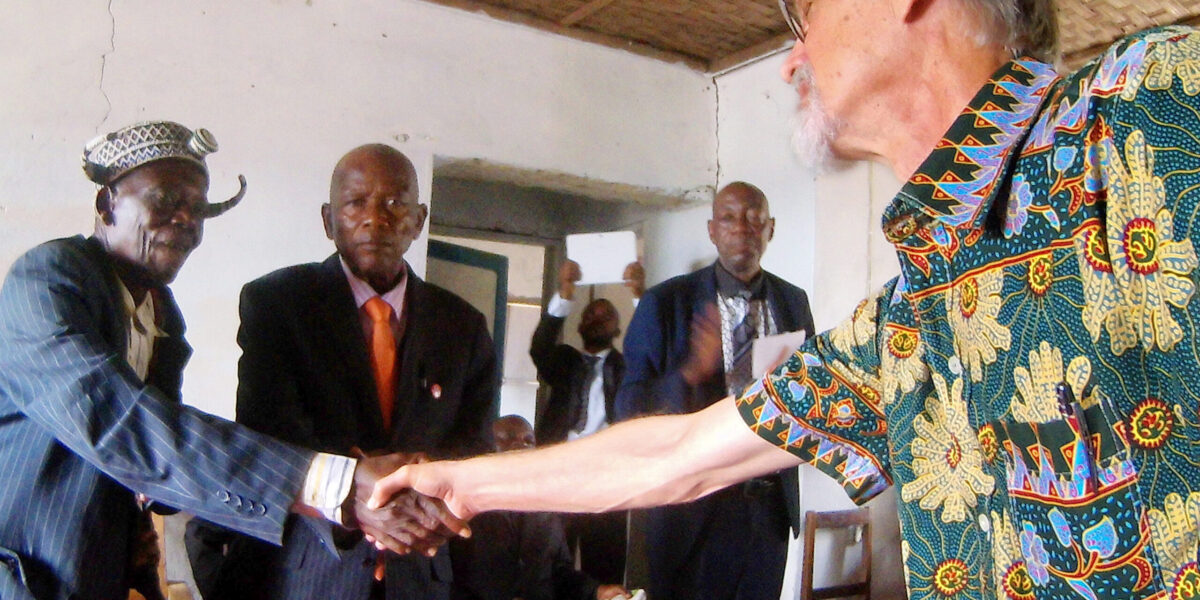ELKHART, Indiana (AIMM/Mennonite Mission Network) – The community lined the sides of the road to welcome six vehicles rolling in from an arduous 500-mile journey from Kinshasa, the capital city of Democratic Republic of the Congo. More than 30 Congolese Mennonite church leaders and mission representatives accepted the Kandale congregation’s invitation to attend a reconciliation ceremony that began Oct. 12, 2017.
The reason for the four-day event was to bring closure to more than a half-century of unresolved remorse for betrayal and strained relationships between mission workers and Kandale’s residents. Kandale was one of the original eight stations of Congo Inland Mission, a predecessor agency of Africa Inter-Mennonite Mission.
A real-life nightmare
On the evening of Jan. 20, 1964, missionary children were in their pajamas and listening to their bedtime stories when Jeunesse rebels attacked. This movement of disillusioned Congolese youth accused North American workers of being collaborators with the corrupt national government and of destroying African culture with the introduction of Western education and values.
"Looking out of our windows we could see flames leaping skyward, and against the red backdrop of burning homes, the running figures of the attackers brandishing bows and arrows," wrote Jim Bertsche in CIM/AIMM: A Story of Vision, Commitment and Grace.
Mission workers were beaten and threatened with death. Gas was poured in a circle around the group of families huddled together. But no stray spark ignited into flame.
"And yet, during the hours of greatest confusion, tension and danger, there was a quiet reality of God’s presence … Ours was an inner calm of spirit that we shall never forget," Bertsche wrote.
As the mission families were being led to the rebel camp in the forest to stand trial, two Congolese nurses stepped out of the shadows. At the risk of their own lives, the nurses negotiated for the mission families to spend the night in the dispensary instead of in the forest.
Four days later, the mission workers were evacuated by United Nations helicopters. The Congolese who protected them were left behind to bear the consequences of not being loyal to the rebel cause. In the chaos, all parties inflicted pain on others, intentionally or unintentionally.
"These events divided the Kandale community and created distance between the community and the mission," said Rod Hollinger-Janzen, executive coordinator of AIMM and part of the delegation participating in the reconciliation ceremony. "The community suffered materially and spiritually from the effects of these divisions."
Ceremony of reconciliation
Originally from Kandale, Macaire Kilambo is a lay leader of Communauté Mennonite au Congo (Mennonite Church in Congo), the largest of the Anabaptist denominations in the country. He also owns a transportation and commercial goods business based in Kinshasa, the capital city. Kilambo recognized the negative consequences of violence and unconfessed shame on his homeland. For several years, he worked with Kandale’s church and community leaders and mission representatives to organize the reconciliation ceremony and to create an environment in which Kandale’s people could prosper.
Several traditional chiefs were present for the ceremony, including a descendant of the chief who had given the land on which the mission was built. Four North Americans, who had been missionary children in Congo, were also in attendance.
André Ndjoko, a Kandale Mennonite Church elder, knelt on the floor before the Congolese and North American Mennonite delegation to ask forgiveness on behalf of his community for how they had collectively mistreated the missionaries who had lived among them.
"We acted against our doctrine, against our community [in 1964]," Ndjoko said. "We destroyed houses that you built. What we have done is against our ancestors, against our parents, and our God. We need to return to you in order to ask forgiveness."
Then, Hollinger-Janzen knelt before the Kandale leaders, accepted their apology, and extended forgiveness on behalf of AIMM mission workers. He acknowledged that no one was blameless prior to 1964, or since. He asked for forgiveness for the mission’s failings and the neglect of the Kandale community following the rebellion.
"Each of us has acted in a way that has not pleased God," Hollinger-Janzen said. "But today we need to come together and join hands once again. All of us need each other’s strength so that God’s Spirit can guide us into the future."
A village chief offered gifts from the Kandale community – ceremonial hatchets, horsehair fly-whisks, and a tiny braided-grass rope that symbolized a cow.
More than a thousand people praised God for the renewed relationships in a six-hour worship service. Brad and Stan Graber, part of the delegation, shared a letter written by their mother, Gladys, who had been in Kandale with her husband, Harold, during the rebellion.
"As God alone can do, he turned this experience into blessing … through [the events of 1964] my faith has grown. What is retained in my memory are the blessings we received from those who love and follow God. May the Spirit of God assure you today that we are one in Christ who offers forgiveness to each one of us."
The third day of the reconciliation event featured a marriage seminar facilitated by the Congo Leadership Coaching Network – Charles Buller of AIMM and three Congolese couples, Damien and Sylvie Kakhenda, Leonard and Antoinette Kiswangi, and Albert and Albertine Mulamba. Buller also grew up in Congo as a missionary kid. The teaching highlighted another aspect of reconciliation, honoring one’s marriage partner. The focus was on valuing the perspectives of women.
Exuberant worship on Sunday, the final day of the event, praised God for the gift of forgiveness and reconciliation and celebrated a fresh start in relationships between AIMM and the Kandale community. A tree was planted in front of the church as a prayer that the reconciliation would become deeply rooted and grow to bear spiritual and physical fruit.







